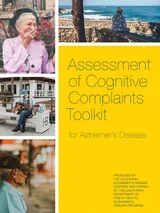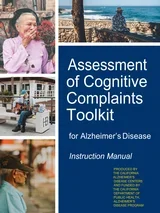Health Professionals
Dementia Screening Toolkit
What is the Assessment of Cognitive Complaints Toolkit for Alzheimer's Disease (ACCT-AD)?
The Assessment of Cognitive Complaints Toolkit for Alzheimer's Disease (ACCT-AD) project was supported by a grant from the California Department of Public Health (CDPH), Alzheimer’s Disease Program (ADP). The Assessment of Cognitive Complaints Toolkit is released in the public domain.
This toolkit was developed for use by healthcare providers and should not be used by non-professionals to diagnose or determine the significance of cognitive complaints without the involvement of an experienced and knowledgeable professional. Interpretation of the answers to these questions requires expert knowledge and must be done in the context of knowing the general health history. If in reviewing this toolkit, you identify concerning problems, you should discuss it with your physician. Similarly, if you have concerns about your memory or cognition, you should discuss them with your physician even if reviewing this toolkit has led you to believe they are not worrisome.
Why was this Toolkit Developed?
The Alzheimer’s Association reported in 2018 that there were over 650,000 Californians suffering from Alzheimer’s disease. Research suggests that almost half of people are not told of their diagnosis. Specialty physicians are most often relied on to provide work-up and diagnosis; however, the numbers of these specialists are not sufficient to meet the overwhelming need.
In 2016, the ten California Alzheimer’s Disease Centers (CADC) were charged by Senate Bill 833 with providing guidance via a toolkit to improve recognition and diagnosis by primary care providers. The CADCs comprise a group of expert clinicians and researchers, with diverse knowledge in the assessment and management of these conditions. To create this toolkit, the CADCs drew upon peer-reviewed evidence, best practices, Medicare and Medicaid policy, and reimbursement standards in the primary care setting.
This toolkit is designed to provide primary care providers with the tools necessary to recognize normal cognition, diagnose Alzheimer’s disease, and identify other cognitive problems requiring specialty referral. It differs from many other toolkits that have been published for this purpose because many other toolkits focus on the diagnosis of dementia but provide limited guidance on identifying the specific neurodegenerative disorder.
CADC Locations:
Assessment of Cognitive Complaints Toolkit for Alzheimer's Disease Provider Wellness Visit/Screening Tool Pocket Guides [PDF]
Assessment of Cognitive Complaints Toolkit for Alzheimer's Disease Provider Wellness Visit/Screening Tool Flow Sheet [PDF]
For more information, please visit the California Department of Public Health (CDPH) website, or contact the UCLA-CADC Program Administrator, Nancy Osuch at (310) 794-3659, or send an email to nosuch@mednet.ucla.edu.

